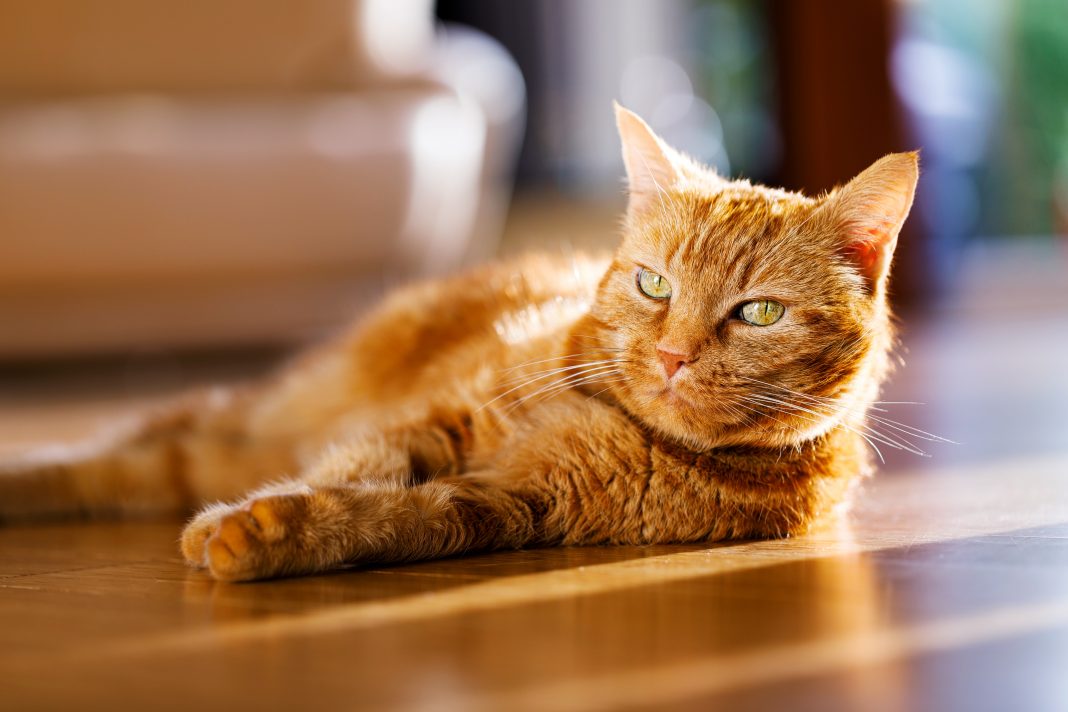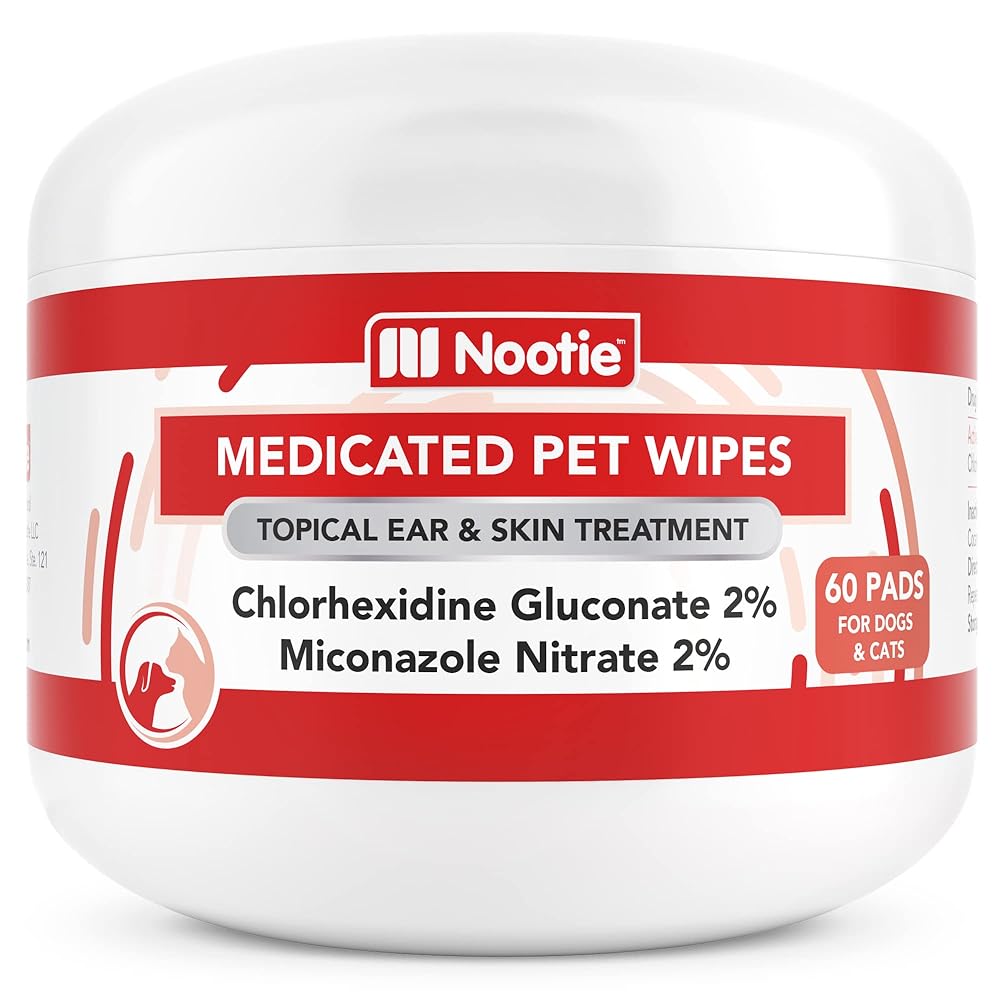Looking for the Best Cat Ringworm Treatments? Ringworm is a common fungal infection in cats that can be concerning for pet owners. With the plethora of treatments available, it’s essential to choose one that’s both safe and effective for your feline friend. In this article, we’ll guide you through top-rated solutions, ensuring your cat receives the best care possible. Let’s dive into the options and help your cat get back to its playful, healthy self!
1. Veterinary Formula Clinical Care Antiseptic and Antifungal Medicated Shampoo for Dogs & Cats
The Veterinary Formula Clinical Care Antiseptic and Antifungal Medicated Shampoo is a pet shampoo that is designed to help alleviate various skin issues in dogs and cats. It is formulated to soothe red, scaly, greasy, or smelly skin that may cause discomfort to pets. The shampoo is pH-balanced, paraben-free, and soap-free, making it a recommended choice for promoting overall skin and coat health without using harmful detergents. It is suitable for pets over 12 weeks of age and should be used as directed, with a test on a small area recommended before full application.
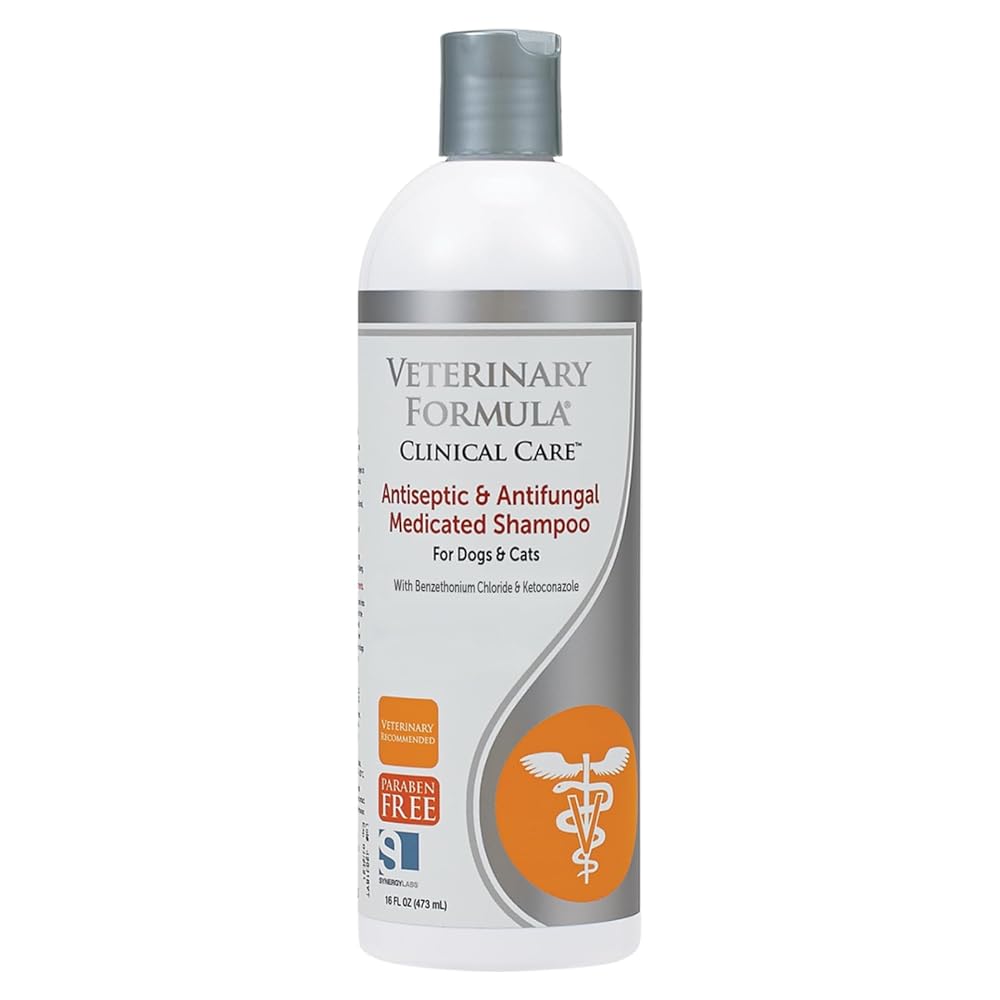
2. BANIXX Dog/Cat Ear Infection, Hot Spot & Ringworm Treatment
Banixx is a non-toxic and pain-free treatment for various skin conditions in pets such as ear infections, hot spots, ringworm, and itchy skin. The product is recommended by veterinarians and has been shown to effectively eliminate bacteria and fungus. It is safe to use around the eye and mouth and does not contain steroids or antibiotics. Banixx is easy to apply and has a three-year shelf life.
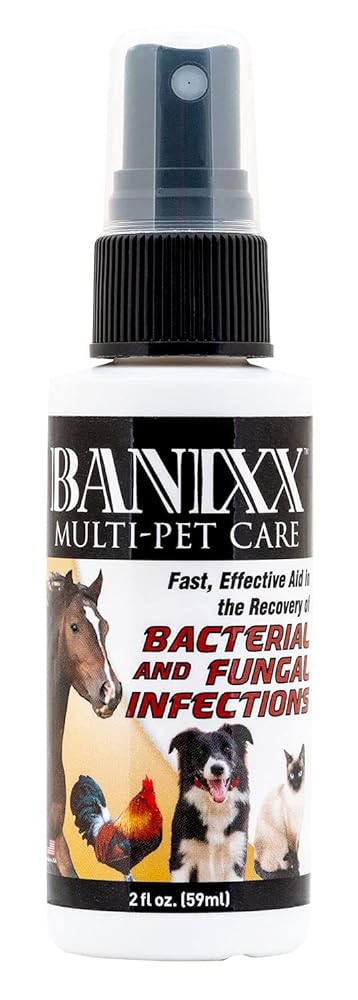
3. Thyme Out for Pets (8oz) – Natural Dog and Cat Itch Relief and skin Treatment
Thyme Out for Pets is a natural itch relief and skin treatment spray for dogs and cats. Made with organic Thyme and Aloe Vera, it effectively treats various skin issues such as fungal, bacterial, and viral infections, as well as hot spots and bug bites. The easy-to-use dispenser tip allows for convenient application, and the pet-safe formula ensures no harm if licked by the pet. The product comes with a 30-day satisfaction guarantee.

4. Pet MD Topical Spray for Dogs, Cats, and Horses with Essential Fatty Acids
The Pet MD Topical Spray is an 8 oz solution designed for pets including dogs, cats, and horses. This product helps cleanse the skin and coat without causing any stinging sensation. It can be used for the topical management of skin and coat, particularly in areas such as face folds, finger folds, underarms, and groin. Additionally, this spray aids in drying the affected area and maintaining a healthy skin and coat for pets. It is manufactured in federally regulated facilities in the USA to ensure quality and safety.
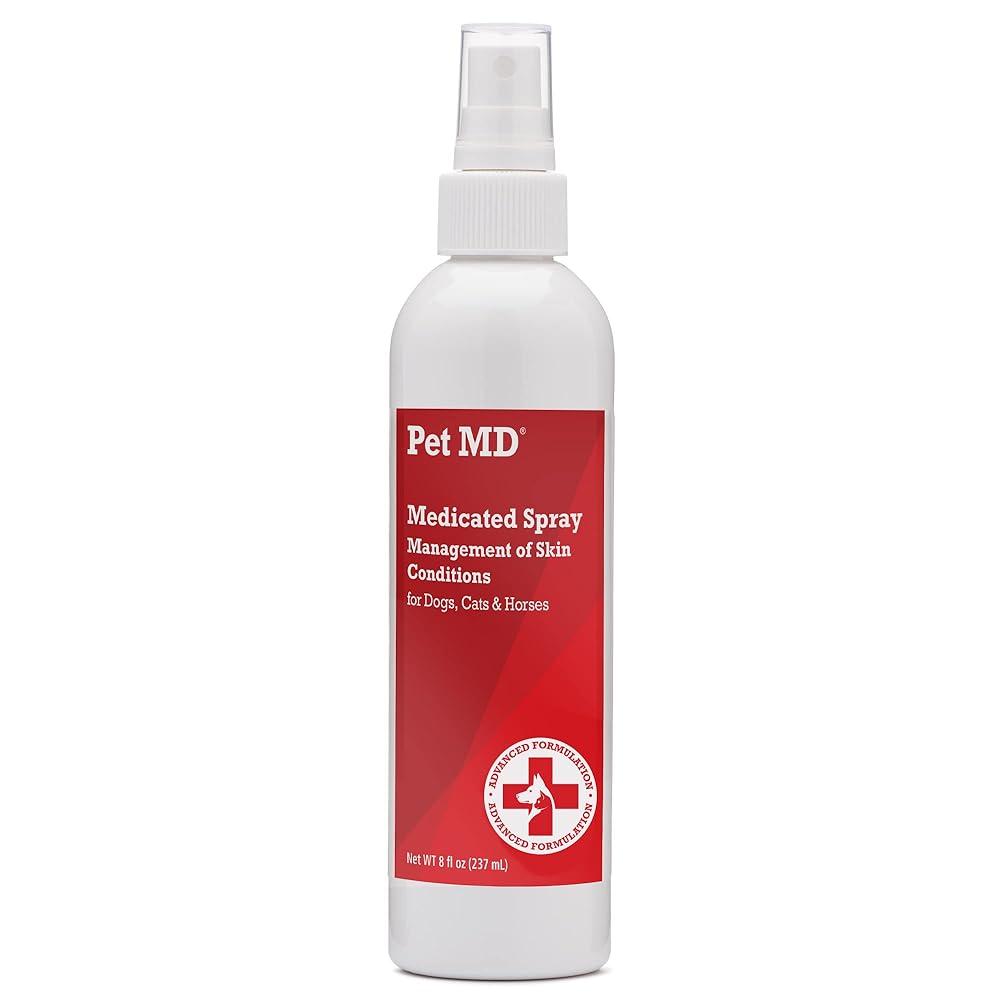
5. Forticept Blue Butter – Hot Spot Treatment for Dogs & Cats
Forticept Blue Butter is a first-aid solution for wounds and skin infections in dogs and cats. It effectively disinfects wounds, promotes healing, and helps prevent skin infections. The pH-balanced formula is safe and non-toxic, making it suitable for all members of the family. Blue Butter is recommended by veterinarians and has been clinically proven to be effective in managing skin and wound infections.
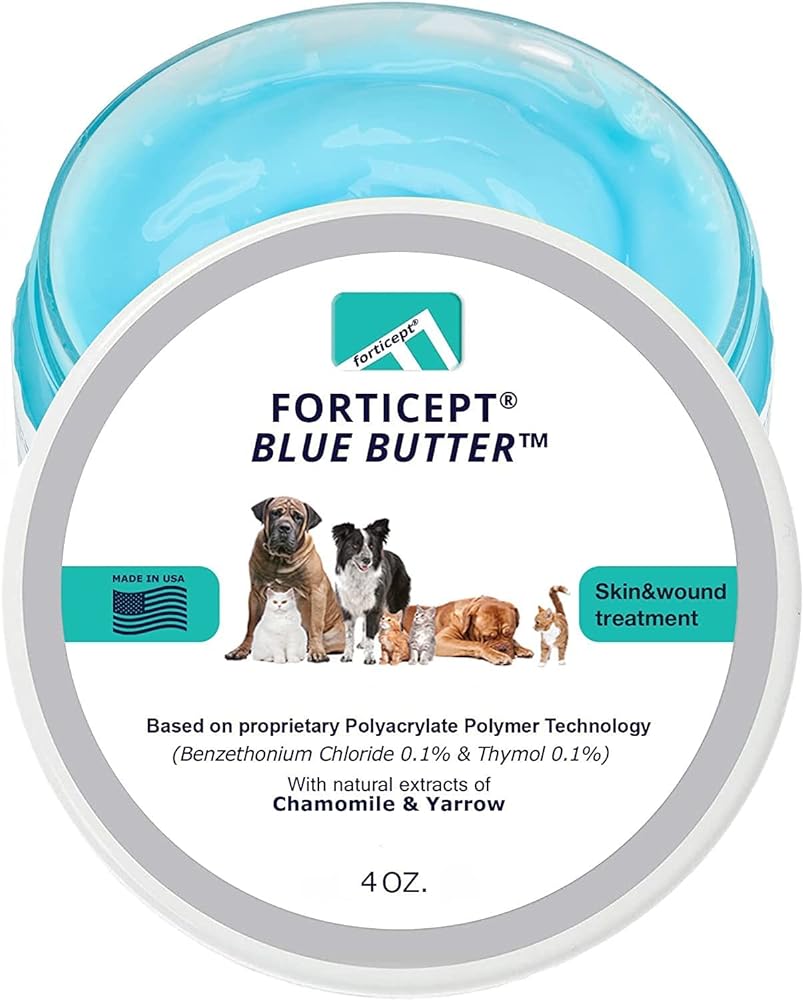
6. Smiling Paws Pets – Antibacterial & Antifungal Wipes for Dogs & Cats
Smiling Paws Pets offers antibacterial and antifungal wipes for dogs and cats, containing ketoconazole and chlorhexidine to treat and eliminate various skin infections such as yeast infections, fungus, bacteria, mange, ringworm, hotspots, and pyoderma. These wipes are small, wet, and thin enough to fit into tight crevices without causing discomfort, and they contain soothing ingredients like aloe and essential fatty acids. The company guarantees that their medicated wipes will alleviate your pet’s skin infections, and if not, they offer a full refund. The wipes are made in the USA in regulated facilities.
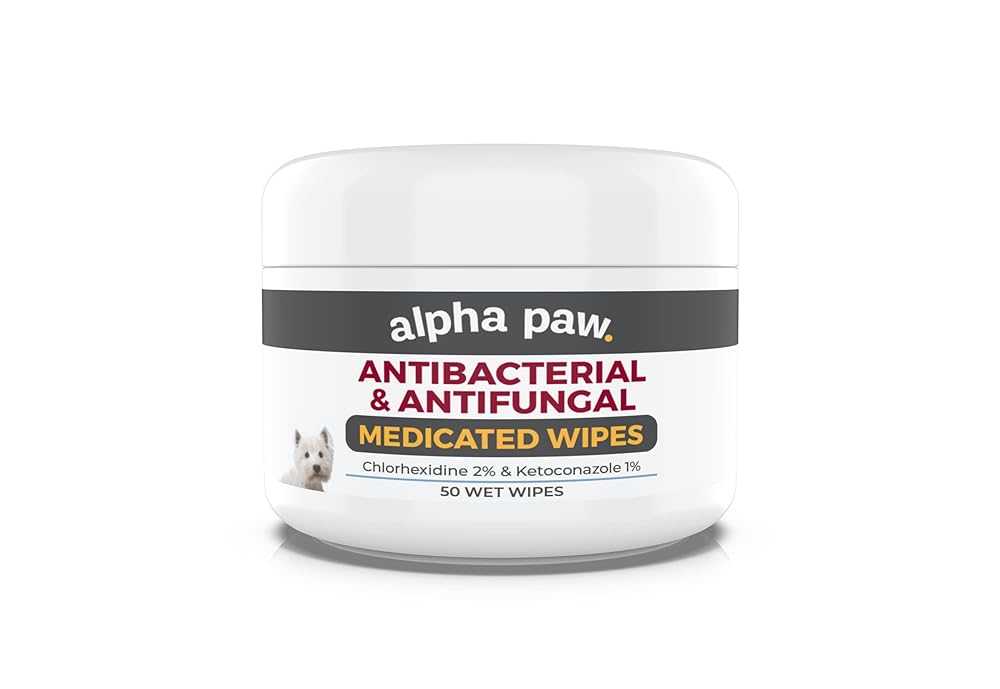
7. Nootie Medicated Dog Wipes, 2% Chlorhexidine and Miconazole Formulated Pet Wipes
The Nootie Medicated Dog Wipes are formulated with 2% Chlorhexidine and Miconazole, which are active ingredients that provide relief for pets. These wipes are designed to treat and provide relief from ear infections, ringworms, hotspots, allergy dermatitis, and other skin conditions. They are convenient to use, gentle on pets, and manufactured in the USA for quality and safety.
What Should I Consider When Purchasing a Cat Ringworm Treatment?
- Consultation with a Veterinarian: Before starting any treatment, always consult your veterinarian to get an accurate diagnosis and treatment recommendation tailored to your cat’s specific needs.
- Active Ingredients: Check the active ingredients in the treatment. Antifungal agents like miconazole, clotrimazole, and terbinafine are commonly used to treat ringworm in cats.
- Safety: Ensure the treatment is safe for cats, especially if it’s a topical product that the cat might lick or ingest.
- Ease of Application: Some treatments might be easier to apply than others. Consider if a topical cream, shampoo, or oral medication is best suited for your cat’s temperament.
- Duration of Treatment: It’s essential to understand how long the treatment should be administered and to follow through to ensure the infection is entirely eradicated.
- Possible Side Effects: Research or ask your veterinarian about any potential side effects the treatment might have and monitor your cat’s reaction during the course of the treatment.
- Brand Reputation: Choose products from reputable brands with positive reviews and testimonials to ensure product quality and efficacy.
- Cost: While it’s crucial to ensure your cat’s health, it’s also a good idea to compare prices and ensure you’re getting good value for your money.
- Concurrent Treatments: If you have multiple pets, consider that you might need to treat them as well, even if they aren’t showing symptoms, to prevent the spread of the fungus.
- Environmental Cleaning: Alongside treating your cat, consider products or methods to sanitize your home, as ringworm spores can persist in the environment and lead to reinfections.
How Do Cats Get Ringworm?
- Direct Contact with Infected Animals: Cats can get ringworm by coming into direct contact with other infected animals. This is one of the most common methods of transmission, especially in environments where many animals are housed together, like shelters.
- Indirect Contact with the Environment: The fungus that causes ringworm can survive for extended periods in the environment. Cats can contract the infection by coming into contact with contaminated objects such as bedding, grooming tools, bowls, furniture, or carpets.
- Contact with Infected Humans: Although less common, cats can also get ringworm from humans who are infected with the fungus.
- Carrier Animals: Some animals can be carriers of the fungus without showing any symptoms themselves. Such asymptomatic carriers can spread the infection to other animals.
- Soil Contamination: In some cases, cats can contract ringworm from spores present in the soil. This is less common but still a possible mode of transmission.
It’s important to note that while all cats can contract ringworm, kittens, elderly cats, and those with compromised immune systems are more susceptible. Regular vet check-ups, maintaining a clean environment, and proper grooming can help in the early detection and prevention of ringworm in cats.
Frequently Asked Questions About Cat Ringworm Treatments
1. What is ringworm, and is it actually caused by a worm?
Ringworm is a fungal infection, not caused by a worm. Its name is derived from the characteristic circular, red lesion it often produces on the skin. The primary fungus responsible for ringworm in cats is Microsporum canis.
2. How can I tell if my cat has ringworm?
Symptoms of ringworm in cats include circular patches of hair loss, scaling or crusty skin, redness, and itchiness. However, some cats can carry the fungus without showing obvious symptoms, so a veterinary diagnosis is essential.
3. Is ringworm contagious to humans or other pets?
Yes, ringworm is zoonotic, meaning it can spread between animals and humans. It’s essential to practice good hygiene when handling an infected cat and to treat all pets in the household if one is diagnosed.
4. How long does it take for ringworm to go away with treatment?
The duration of treatment can vary based on the severity of the infection and the type of treatment used. Typically, treatment lasts several weeks, and it’s crucial to complete the full course even if symptoms improve to prevent recurrence.
5. Can I prevent my cat from getting ringworm?
While it’s challenging to guarantee prevention, regular vet check-ups, maintaining a clean environment, proper grooming, and isolating new pets until they’re checked can help reduce the risk.
6. Are there natural remedies for cat ringworm?
There are natural remedies like tea tree oil or apple cider vinegar that some claim can treat ringworm. However, their effectiveness is debated, and they might not be safe for all cats. Always consult a veterinarian before trying any home remedies.
7. How is ringworm diagnosed in cats?
Veterinarians often use a Wood’s lamp (a special UV light) to check for ringworm. However, not all ringworm species glow under this light, so a fungal culture or microscopic examination might also be necessary.
8. What should I do about ringworm in multi-cat households?
If one cat is diagnosed with ringworm in a multi-cat household, it’s advisable to have all the cats checked. The environment should also be thoroughly cleaned to eliminate fungal spores and prevent reinfection.
9. Can ringworm recur in my cat after treatment?
Yes, if the environment isn’t thoroughly cleaned or if the full course of treatment isn’t completed, there’s a risk of recurrence. Regular monitoring and following vet advice can help reduce this risk.
10. Are there side effects to ringworm medications?
Most ringworm treatments are safe, but side effects can occur, depending on the medication and individual cat reactions. Always observe your cat after administering any treatment and consult your vet if you notice any adverse reactions.
Final Summary: The Best Cat Ringworm Treatments
In this article, we reviewed the Best Cat Ringworm Treatments. Ensuring the health and comfort of your feline companion is paramount, and with the right treatment, ringworm can be efficiently managed. We hope our recommendations guide you to the most effective solution for your pet. Remember, always consult your veterinarian before starting any treatment to ensure it’s the best fit for your cat. With care and vigilance, your feline friend will be ringworm-free in no time!

